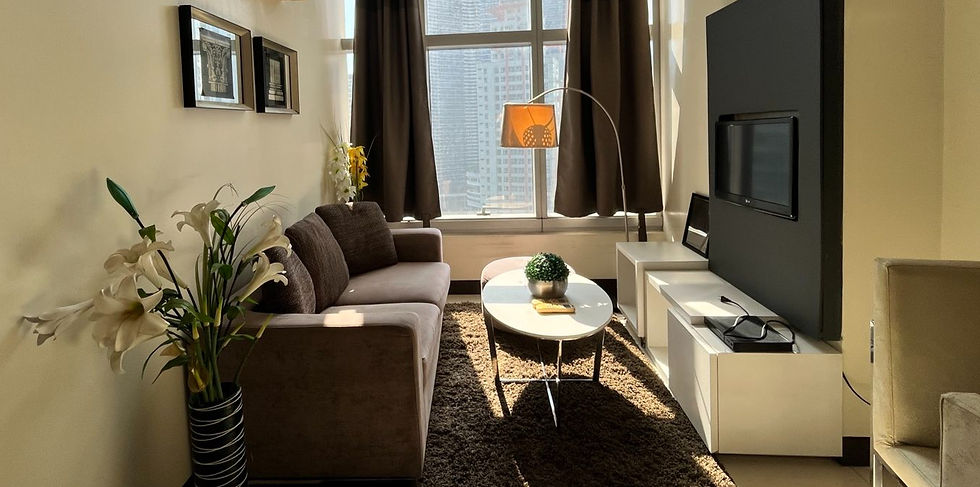The Hybrid Work Effect: Why Manila Rent Trends Are Shifting Toward Flexible, Lifestyle-Oriented Spaces for Expats
- bedandgoinc
- 2025年4月22日
- 読了時間: 3分
April 22, 2025
Manila has long been a top destination for expatriates, offering a rich mix of culture, affordability, and opportunity. But as the global workforce embraces remote and hybrid work setups, a new kind of expat lifestyle is emerging in the city—one that blends professional flexibility with a desire for comfort, convenience, and community.
Today's remote-working expats are not just looking for a place to live—they're searching for a space that supports productivity, wellness, and social connection. And in 2025, that shift is deeply influencing Manila's rental trends.

Let's explore how hybrid work is redefining what expats are looking for in a rental—and why flexible, lifestyle-oriented living is on the rise.
1. Expats Are Redefining What "Location" Means
Traditional expats often chose condos close to business hubs like Makati, BGC, or Ortigas. But for remote workers, priorities are shifting. The focus now is on lifestyle amenities and work-from-home comfort, not just office proximity.
Expats are increasingly choosing neighborhoods like:
Capitol Commons (Pasig) – known for walkability, co-working cafés, and green spaces
Eastwood City (Quezon City) – a tech-friendly, live-work-play environment
Salcedo or Legazpi Village (Makati) – with quiet, residential streets and access to community parks and weekend markets
For digital professionals and freelancers, it's not about getting to work—it's about where you want to live while working.
2. Rentals Must Support Remote Productivity
The hybrid expat renter needs a unit that functions as both a home and a professional workspace. This means thoughtfully designed interiors that separate work from leisure—even in smaller units.
Today's must-haves include:
High-speed, stable internet
Bright, ventilated workspaces with natural light
Noise-insulated walls or private corners for video calls
Proximity to co-working spaces or communal lounges with fast Wi-Fi
Units in developments like The Ellis Makati, The Rise, Shangri-La, or One Eastwood Avenue are catering to this niche with integrated work pods, Zoom rooms, and shared meeting lounges.

3. Live-Work-Play Amenities Are Non-Negotiable
For expats far from home, comfort and convenience go beyond four walls. The ideal condo in 2025 isn't just functional—it's experiential.
Work-from-home expats are drawn to buildings with:
Rooftop lounges or terraces for break-time fresh air
Fitness centers and pools for physical wellbeing
Yoga rooms, meditation areas, or spas to de-stress
Concierge services for deliveries, food orders, and even translation support
In short, amenities should help renters maintain a healthy, balanced lifestyle—all within the safety and accessibility of their building.
4. Flexible Lease Terms Attract Digital Nomads and Long-Stay Expats
Whether staying six months or several years, expats now want lease terms that match their ever-evolving work arrangements. Flexibility has become a key differentiator in the Manila rental market.
Popular lease preferences include:
Fully furnished, move-in ready units
Short-term contracts with options to extend
All-in rental packages with utilities and internet included
Transferable leases between projects by the same developer
Remote expats value simplicity and mobility—and landlords who offer that are winning their loyalty.

5. Property Managers Are Evolving to Serve Global Tenants
To meet the expectations of remote expats, property management teams are upping their game. It's not just about maintenance anymore—it's about creating a seamless rental experience that feels both local and global.
Expat-friendly services now include:
Multilingual support (English, Japanese, Korean, etc.)
Secure, contactless access and smart lock systems
Utility setup assistance and bill payments
Online tenant portals for maintenance requests and payments
This kind of responsiveness builds trust with expats who may be navigating life in Manila for the first time.
6. Strong Expat Communities and Social Connectivity
Remote work can be isolating—especially for expats in a foreign country. That's why many are choosing condominiums and neighborhoods that support a sense of community.
What expats are drawn to:
Buildings with regular socials, wellness classes, or community events
Proximity to international schools, embassies, and expat clubs
Friendly environments where they can meet like-minded professionals
Popular buildings like Gramercy Residences, The Viceroy in McKinley Hill, and Shang Salcedo Place are known for their vibrant, international tenant mix and communal amenities.

Remote Work Is Redefining the Manila Expat Lifestyle
As more expats settle into hybrid or fully remote careers, Manila's rental landscape is transforming to support this change. No longer confined to business centers or traditional corporate housing, today's remote professionals are choosing homes that allow them to thrive—personally and professionally.
From lifestyle-focused locations to wellness-centric amenities and flexible lease options, the rental trends of 2025 reflect a deeper shift: expats are prioritizing quality of life, not just convenience.
If you're a remote worker relocating to Manila, now is the time to explore properties that align with your work-from-anywhere lifestyle. Because here, your home isn't just where you sleep—it's where you live, work, and grow.
SOURCE:









コメント